子ども達の急成長が見られた5日間!北海道サマーキャンプレポート!
こんにちは、GLI代表の鏑木です。8月1日から5日まで4泊5日。GLIサマーキャンプ in 北海道が開催されました。
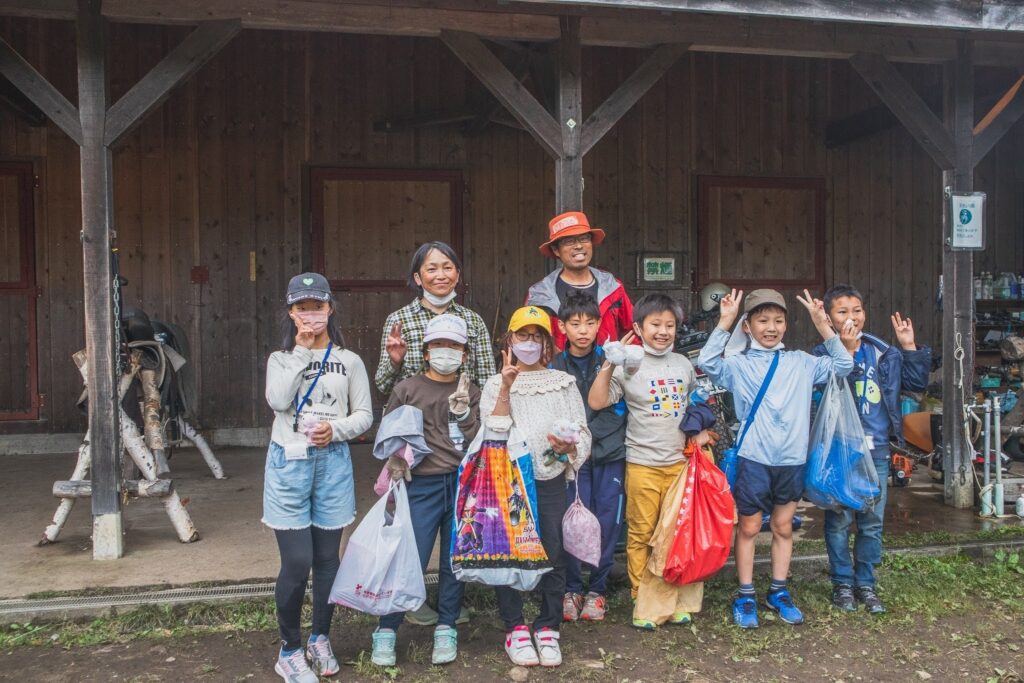
何より大きな怪我もなく、そしてたった5日間でしたが、子供達の成長が日に日に感じられるキャンプでした。隠しカメラでご家庭に届けて見て頂きたい位で、お世辞では無く毎日成長した5日間でした。
この3年、コロナの影響で子供達は本来得るべき経験を得られていません。この現実は子供達にとって非常に憂慮すべき事象です。これからもっとこの様な機会を増やしていけるといいなと、スタッフも感じたツアーでした。
このキャンプの狙い
5日間北海道の大自然でのキャンプ。このキャンプでの目的は『馬に乗って森の中へトレッキング、”馬旅”へ行くこと』です。と言ったところで、文章だけを見ると、簡単そうに感じるかもしれません。
ただ、1つお伝えしておくと、人間によって慣らされた馬で、係の人が手綱を引いて馬場を一周する様な出来合いの乗馬体験ではありません。
”北海道の大自然を生きる馬”に対して、いかにコミュニケーションを取り、彼ら(馬)からの信頼を勝ち取り、背中に乗せてもらって馬旅に行くことが今回のキャンプの目的It is.
馬旅に出るまでにクリアしないといけない数々のチャレンジを、いかに自分、またはペアのチームでどう乗り越えたら良いか?を考え、アクションを起こしていく。そこに子ども達の成長があると私たちは考え、このキャンプを設計しました。これこそこのキャンプの狙いでした。
チャレンジに挑む子ども達の姿
ちなみに、目的である「馬旅に行く」までに乗り越えるべきチャレンジは大きく「5つ」It is.
1)お気に入りの馬を森の中で見つけて、無口(あごひも)を付ける。
2)手綱を引いて馬をコントロールする
3)ブラッシングをしたりえさを与えたりしてコミュニケーションを取る
4)鞍を正しく背に乗せる
5)歩いている時にリーダーシップを発揮する
です。それぞれ実際の写真や当時の様子にも触れながらお話しできればと思います。
ちなみに、活動の終わりには、今日はどんな一日だったか?何が難しかった?明日チャレンジしたいこと、など振り返りを行います。感じたことを自分の言葉で言語化することで、自身の成長や気づきを感じ取ってもらうためです。
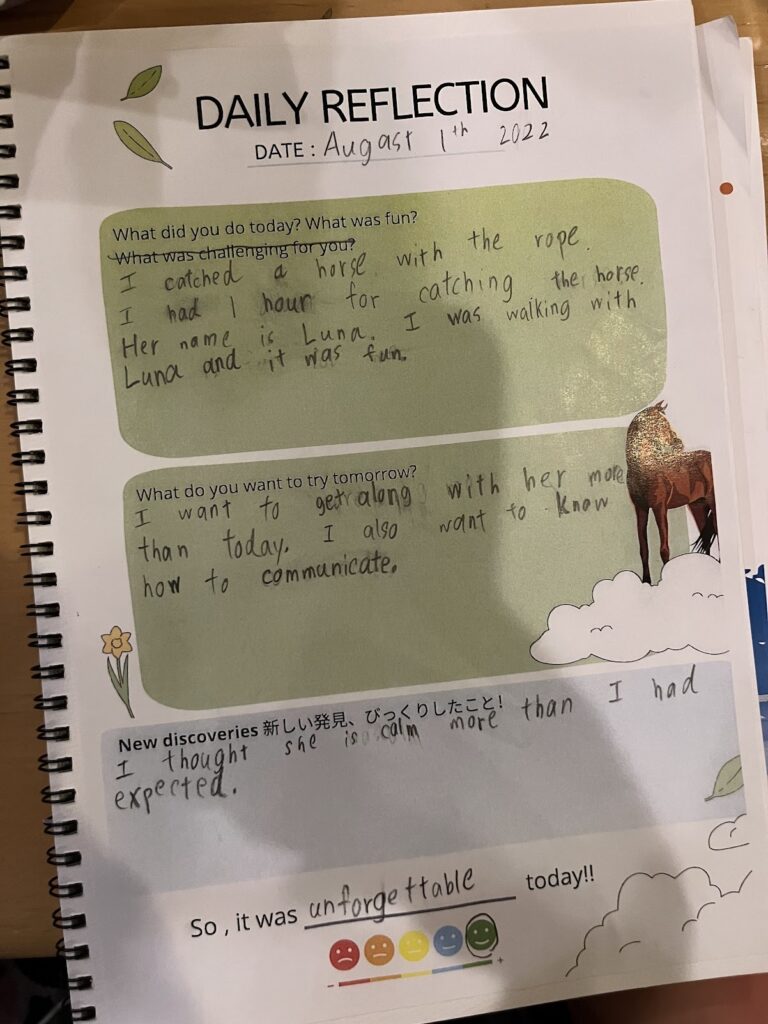
毎日頑張っている子どもたち全員には、“Fearless Leader” “Laugh in the face of fear award” “Solid as a rock” “Jack of all trades” “Horse Whisperer”などの賞が与えられました。では、彼らの「チャレンジ」に戻ります。
チャレンジ①お気に入りの馬を森の中で見つけて、無口(あごひも)を付ける。
子ども達にとっては何もかも全くの初体験。北海道の森の中も、森の中の馬も、もちろん馬に無口をつけるのも初めてです。
テレビで見る馬は可愛いけど、実際に近くで見るとめっちゃ大きくて怖い。2人のチームで相談してどの馬がいいか決めて無口を着けるのですが、怖くて中々近づけないし、ずっと草を食べてて頭を上げてくれない。
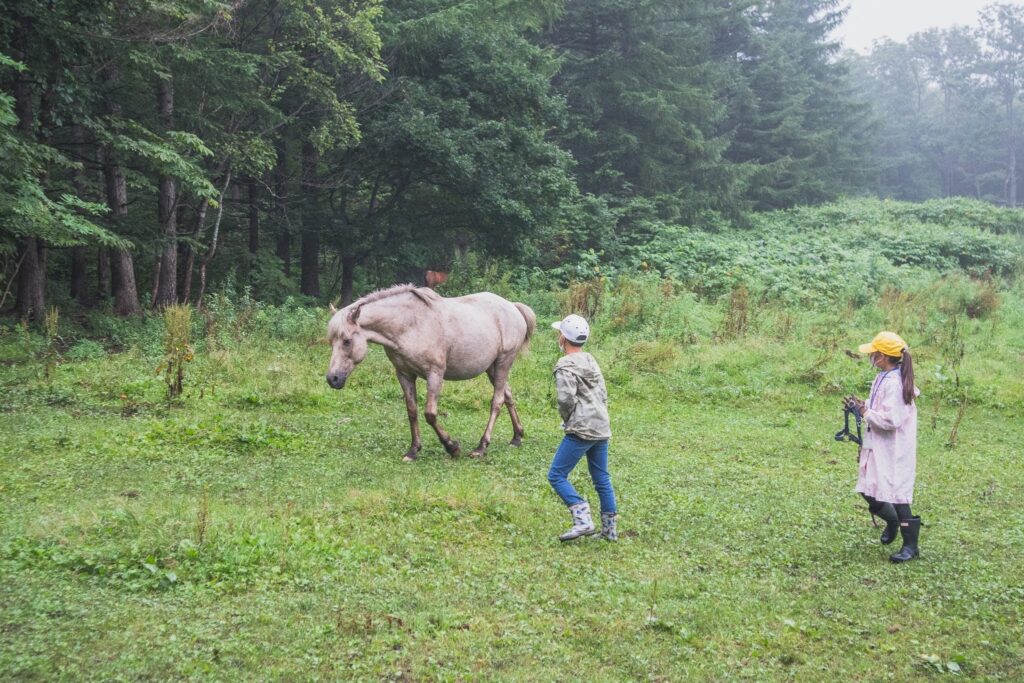
事前学習で、馬ってどんな動物?どうやったら捕まえられるだろう?とたくさん考えていてくれましたが、いざとなると体の大きな馬が怖くて及び腰になったり、チームで協力して捕まえなければならないのに、チーム内での喧嘩が勃発したり。
でも、それも貴重な経験。自分たちの主張を言い合うだけでなく、どうしたら収めることができるか、話し合った末どこに自分の非があるか、など、自分たちで考えまとめなければいけません。これも彼らにとっては良い機会になったはずです。
チャレンジ②手綱を引いて馬をコントロールする
馬は群れの動物。リーダーがいてそのリーダーに付き従って行動するそうです。だからリーダーシップを取らないと言う事を聞いてくれません。
また、馬とコミュニケーションを取る際、数々の注意を払わなければなりません。目をじっと見ない、お腹を見ない、息を止めない、前から近づく。これは全て馬が肉食動物から身を守る為に身に付けた習性だそうで、これらに反すると襲われると思うそうです。
そして、一旦手綱を持ったら堂々と振る舞わないと、言う事を聞いてくれず、引き手がパニックになると馬が暴れ出すそうです。そんな数々の注意を払いながら子どもたちは見事にやってのけました。
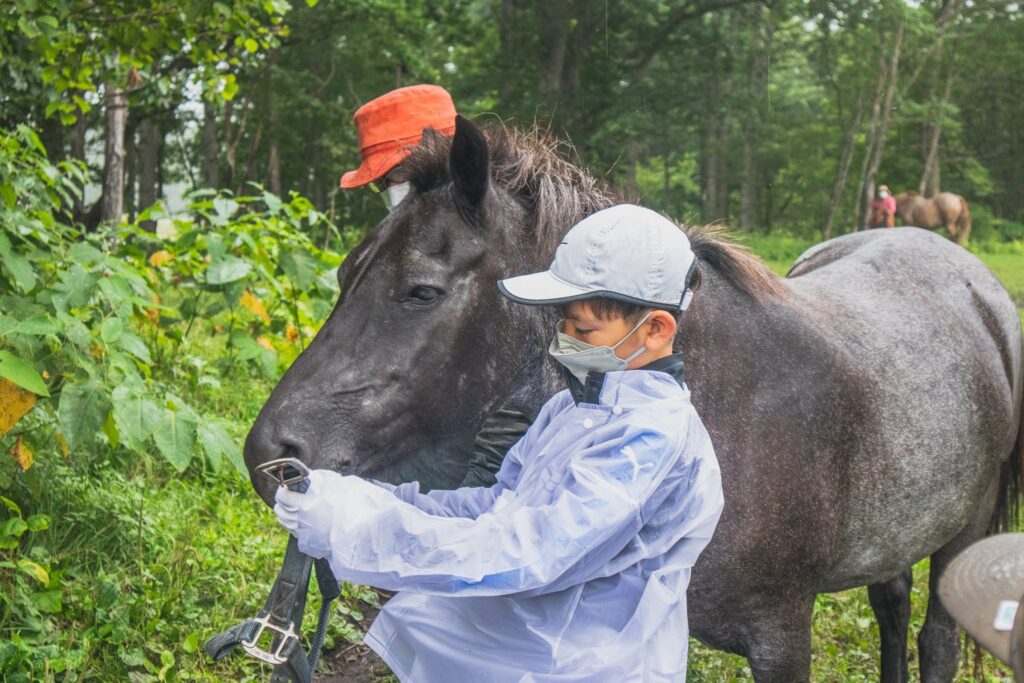
チャレンジ③ブラッシングをしたりえさを与えたりしてコミュニケーションを取る
まだまだ彼らのチャレンジは続きます。次は、蹴られる恐怖と踏まれる恐怖でビクビクしながらのブラッシングです。馬の後ろに立たないこと。また、えさを上げる時も噛まれる危険性があるため、そんな危険を感じて、最初はおよび腰になっていましたが(笑)
恐怖がまさって、中々猫を可愛いがる様には行きませんが、それでも、次第に勇気を出してブラッシングを行う姿は頼もしささえも感じてくるほどです。
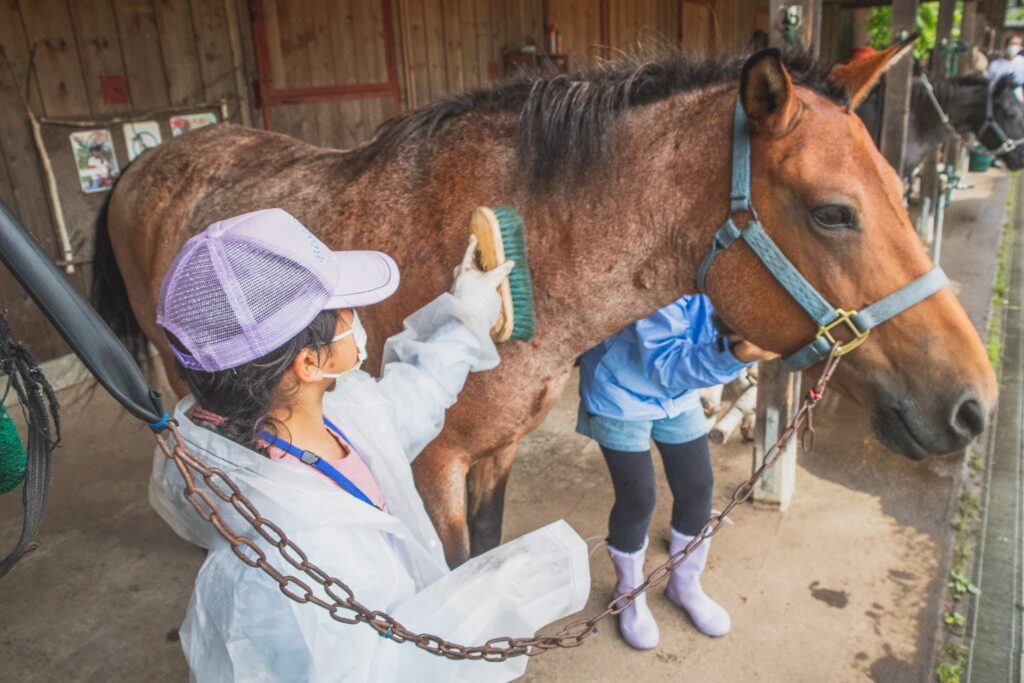
チャレンジ④鞍を正しく背に乗せる
なんと鞍の重さは15キロ以上。大人でも馬の背の高さに乗せるのは至難の技。しかも鞍の下には2枚の布を敷いてお馬さんが痛く無いようにしてあげないといけません。
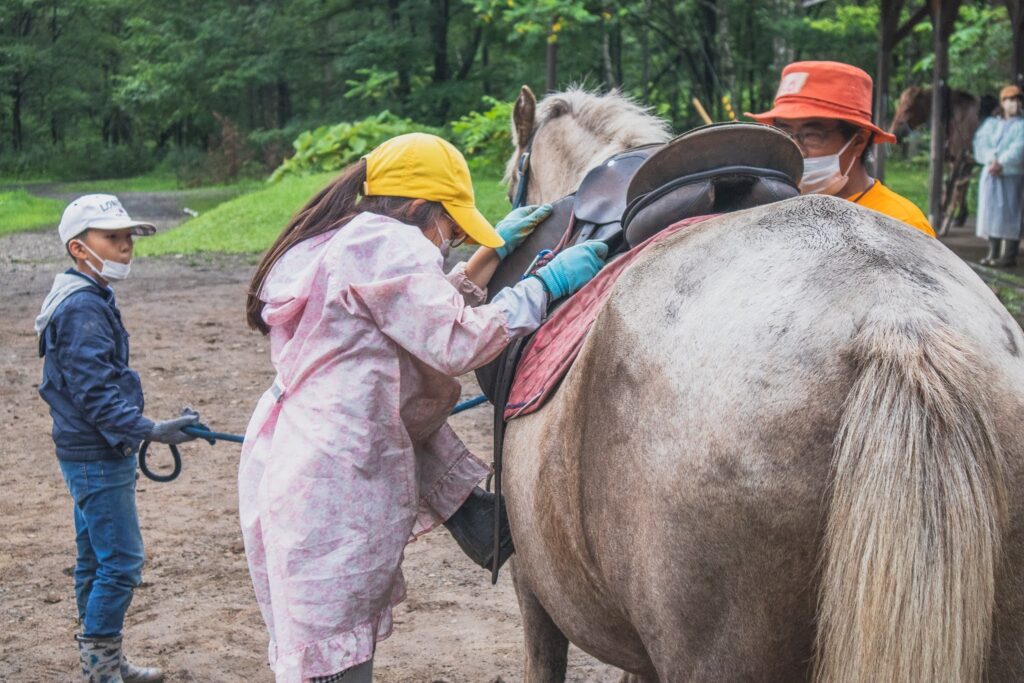
また鞍を占めるバンドはしっかり締めないと乗っている人が落ちてしまうので、力が必要です。しっかり乗せられなければ馬の先生の許可が降りません。一人では出来ないので、チームメンバーと協力してやるのですが、上手くいかず喧嘩になる事もしばしばでした。それでもちゃんとチャレンジをやりきる姿に成長を感じました。
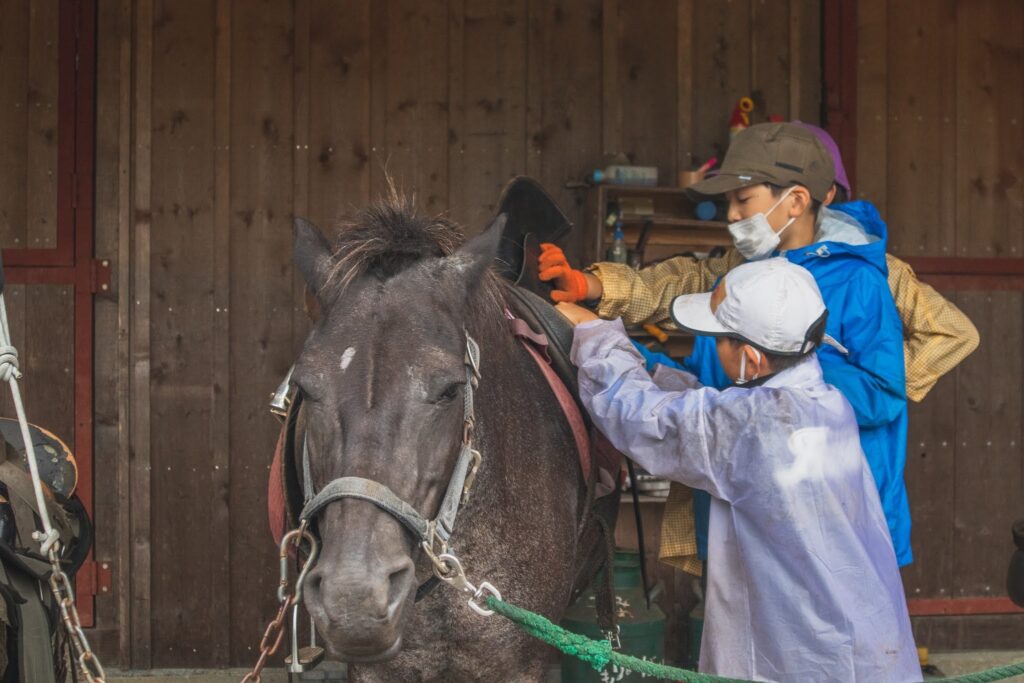
チャレンジ⑤歩いている時にリーダーシップを発揮する
森の中の長距離ライドに出かける事が最終目的なので、途中勝手にえさを食べたり好きな方向へ行かせてはいけません。また、誰かが上に乗っている時にえさを食べる為に頭を下げると乗っている人が危険です。ですので、馬に引き手の言うことを聞かせる必要があります。右や左に意のままに動かせないと乗っている人にも自分にも危険が及ぶのです。
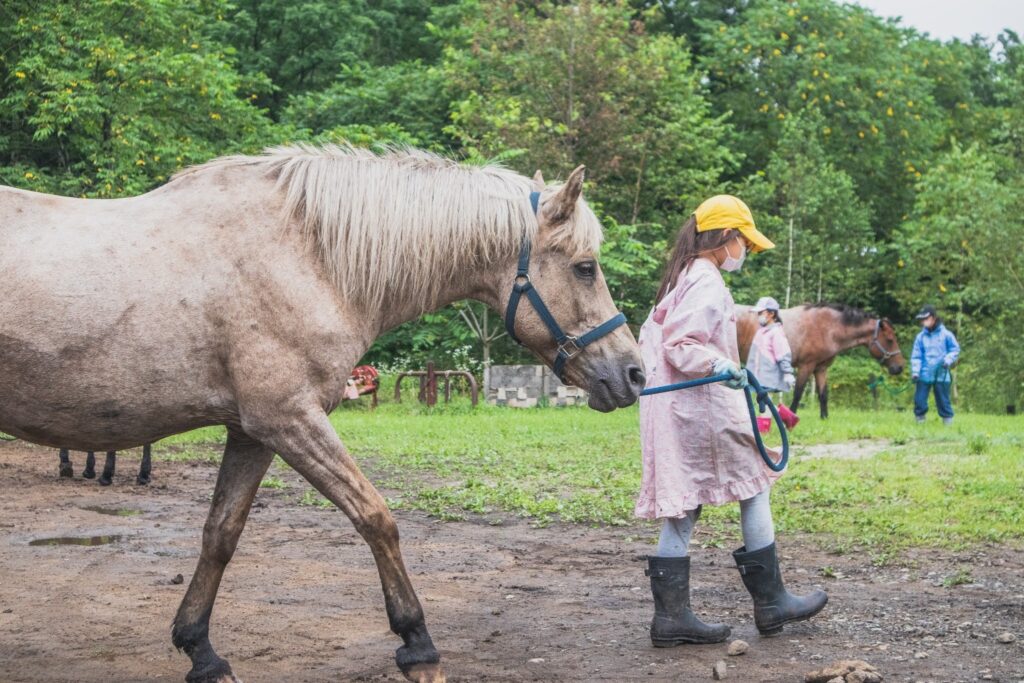
これらを克服して、最終日の午前中に検定試験を受けて、やっと約2km森の中の乗馬に出かけられるのです。
森の中の景色は別世界。東京では絶対味わえない景色。恐怖に打ち勝ってチームメートと喧嘩して、馬に乗ったり手綱を引いたりする技術をマスターしてやっと出かける森の散策。
ずっと小雨や曇りだったのですが、4日目の午後にご褒美の様に青空が広がってくれました。馬の上から見る景色は一体子供達にはどの様に写っているのか?大人には決して解らない景色だと思います。
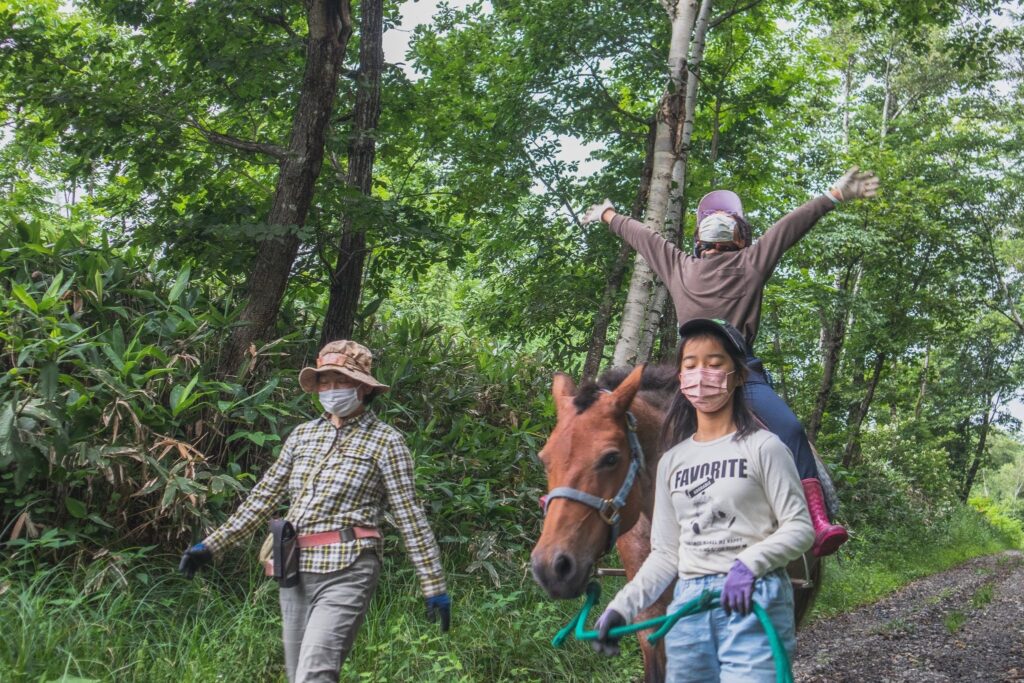
そして、こちらが活動最終日、”馬旅”へ出発前の自信にあふれた顔の子どもたちIt is.
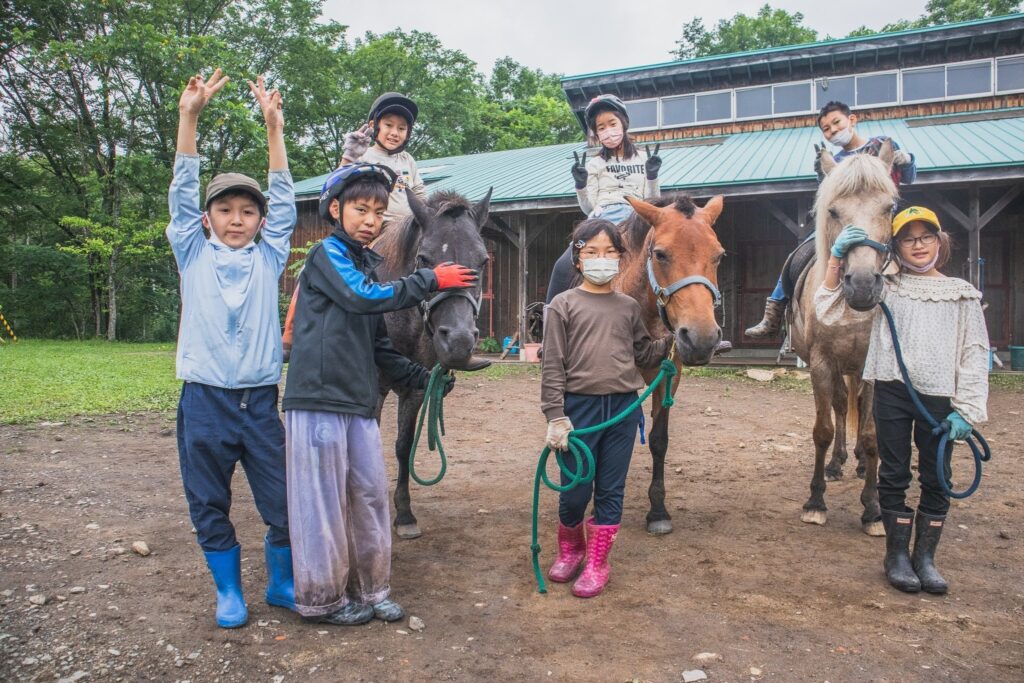
同行させてもらった私や、自宅で我が子を心配していた親御様も、彼らの表情の違いにただただ驚くばかりでした。「環境が子を育てる」とまさに体現してくれたような場面でした。
ちなみに、馬旅のみならず、クッキングなどのアクティビティでも、自分の役割に責任をもって買い出しから、調理まで行いました。全てが自主的にコミュニケーションと取らないと成し遂げることのできない体験ばかりでした。
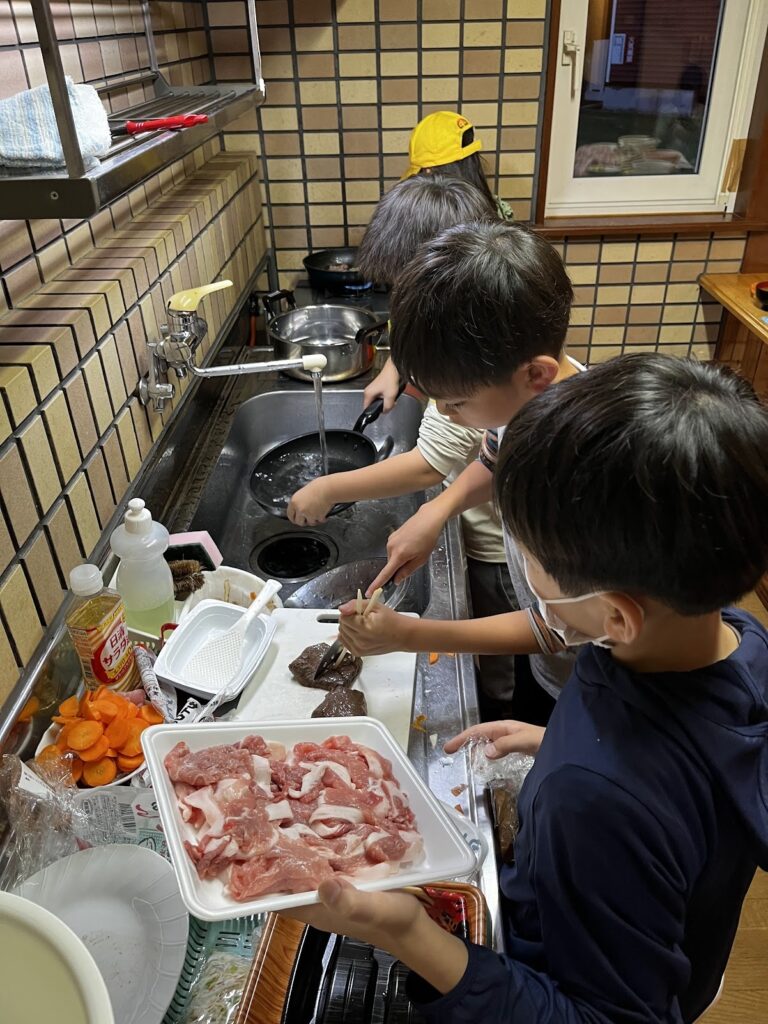
5日間を通し、子どもたちが学んだこと
改めて整理したいと思います。今回の5日間を通じて彼らが身につけた「資質」や「能力」が・・
1:新しいことやものに勇気を出して立ち向かう姿勢
諦めずにチャレンジを続ければ必ず前に進むこと。
2:教わったスキルや知識を正しく使う難しさ
教わっても正しく出来ないもどかしさや悔しさ。出来なければ乗れないし、前に進まないから何とかできるようにするしか無いこと。工夫をすること。
3:仲間と話し合ったり、意見がまとまらない時も折り合いをつける力
4:自分で考えて決断して行動する力
5:目的意識とそこに集中すること
勇気やスキルが身に付いてくると、今何をすべきなのかを考えて作業に集中し、お互い助け合って一つのタスクを完了する事が出来る様になりました。よって一つの作業を終える時間が圧倒的に短くなりました。
6:達成感
これは説明不要と思います。
Participant's Voice
最後にこの5日間を旅した参加者、その親御様、同行したスタッフの声をご紹介I will do so.
●参加した生徒さん
Q. サマーキャンプに行く前と後で、何が一番変わったと思いますか?
怖くてびびっていたことも挑戦する大切さを学んだ。馬と触れ合えるようになった。チームプレーができるようになった。
●親御様の声(3名)
自分から親元を離れて行きたいと言うとは思っていませんでした。あまり多くを語りませんが、キャンプでの経験は楽しかった思い出と、彼のやり切ったという経験値になっていて、チームプレーも学校でのやり方とは全然違って、できるようになった。と、言っていました。できるという、自信につながったと感じます。皆さんの手厚いサポートもあり、安心して楽しく素敵な経験をさせてあげることができました。参加できてよかったです。ありがとうございました。
日々の写真から、責任を持って行動出来ている様子や、面識の無い友達とも友好を築いたりと普段の生活ではできない経験ができた。
あらゆる場面で生かせるリーダーシップや社会性、自信、料理への興味などを普段と違った環境の中で学び、自主的に考える機会となったと感じる。
●同行スタッフの声
初めての事の連続でしたが、子供達は見事やり抜いて、素晴らしい成長を見せてくれました。馬とのプログラムではどんな状況下でも説明を慎重に聞き、トライア ンドエラーコレクトを繰り返し、何度も試練を乗り越え、一瞬でも諦めた姿を見ることが無かった。
常に自分を軸に行動し、興味事においては没頭し、出来るようになりたい事を見つけた時は質問することを躊躇すること無く、結果的に成功体験を積み重ねていた。
最後に
欧米では、夏休みに入るとこぞってサマーキャンプに出かけます。それも3泊や4泊ではなく、数週間単位です。その理由は、特に子供の頃は勉強以上に生きる力の育成が大事だと理解しているからIt is.
教育の本質が勉強だけではなくむしろ勉強も含めた広い”学び”にあると考えられているのです。学びとは生きる力の獲得の為の経験知やスキル獲得作業全般を指しています。そして欧米の学校やサマーキャンプは、この学びの設計がとても効果的かつ実践的になされていると言えます。
努力やチャレンジ精神無くして達成できないハードルを設定し、仲間と共同作業をしなければ達成できない条件を設け、必要なスキルを獲得し駆使して初めてゴールに到達出来るような学びのプログラム。
そして決して先生からの一方通行にならず、子ども達自らが考え議論し挑戦できる様に促すスキルを先生達が持っていて、何より子供達の変化を見逃さず少しでもできる様になったことを言語化して、子ども達にフィードバックする事で自信と達成感を植え付けるのです。こうやって過ごした数週間で子供達は人として大きく成長するのです。
このような子どもたちが学校で学べない、体験できないような経験をこれからも私たちGLIは提供していきます。ぜひ、次回開催の際は(同じプログラムをするかは不明ですが)、ぜひご参加を検討してみてください。
ここまでお読みいただきありがとうございました。
GLI Representative Kaburaki
What's the class atmosphere and lesson content like?"
I would like to discuss my education."
I'm not sure I'll be able to go to school overseas."
If you have such concerns or are interested in GLI
If you have any questions, please feel free to contact us.
Please come to our office for a consultation.
![Harumi, Hiroo, Musashi Kosugi] GLI, an English conversation school specializing in the four skills of English](https://gli-english.com/sndp-rstm8/wp-content/themes/gli-english/assets/img/logo.svg)
![Harumi, Hiroo, Musashi Kosugi] GLI, an English conversation school specializing in the four skills of English](https://gli-english.com/sndp-rstm8/wp-content/themes/gli-english/assets/img/logo-scrolled.svg)

